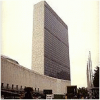
The United Nations are at a crossroads. They have not really proven to be unworthy, they simply have not been at all convincing. Their reform is a critical issue, with several possible responses. For some, the United Nations should become the political system of neoliberal globalization. For the author, the issue is rather to define and to implement radical reform of the institution. The starting hypothesis is that the alterglobalization movement is the driving agent for broader alliances with other social and political forces, aiming at the transformation of the UN in the perspective of building a global democracy.
These positions play different roles in awareness raising and critical analysis. In terms of proposals, the thinking focuses on the positions that structure the arena of discussions and confrontations on the needed reforms. For some, the UN should become the political system of neoliberal globalization, a mix of institutions of the World Bank, IMF, and WTO type on the one hand, and a military alliance of the NATO type on the other. The advocates of moderate reformism consider that the existence of regulation, even partial and poorly effective, is an objective in itself. The idea is to be careful not to break the machine which risks handing over all the power to US unilateralism, and to be content with adjustments whenever possible. The advocates of radical reform consider that it is necessary to accept the risk of challenging the system and to mark the new departure that is needed, considering the nature of the challenges. This is the author's perspective.
Knowing whether it is possible or not to reform the United Nations does not appear to be decisive in itself. The question is to define a radical reform and make its implementation possible. Defining guidelines and the current situation is a fairly easy way to define the necessary reforms. But these reforms will not be implemented automatically. The United Nations have shown their capacity to change. Set up in the context of the Cold War, they were also capable of taking up the decolonization issue and contribute to it. There is a strategic question. The hypothesis that the alterglobalization movement can be the vector of this transformation brings up the question of alliances to impose it. There is also a question of method, one that makes it possible to link a general perspective with the fights and mobilizations for particular reforms.
The proposed approach is the following: start from the current stakes and challenges involved in the international institutions, globalization, wars, and international law; define the guidelines for building a new foundation, global democracy and a global social contract, as well as the strategic position of international law; formalize a strategic line, that of the movements and fights for the democratization of the international system, with a twofold requirement, to place each of the democratization proposals in the perspective of global democracy and to place each of the fronts for democratization in a broader alliance for a new foundation of the international system; and clarify the proposals for radical reform and consider the social and political forces that can bring them about as well as possible alliances.
Source: CADTM
_ www.cadtm.org